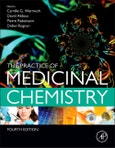The Practice of Medicinal Chemistry, Fourth Edition provides a practical and comprehensive overview of the daily issues facing pharmaceutical researchers and chemists. In addition to its thorough treatment of basic medicinal chemistry principles, this updated edition has been revised to provide new and expanded coverage of the latest technologies and approaches in drug discovery.
With topics like high content screening, scoring, docking, binding free energy calculations, polypharmacology, QSAR, chemical collections and databases, and much more, this book is the go-to reference for all academic and pharmaceutical researchers who need a complete understanding of medicinal chemistry and its application to drug discovery and development.
Please Note: This is an On Demand product, delivery may take up to 11 working days after payment has been received.
Table of Contents
Section 1 General Aspects of Medicinal ChemistrySection 2 Lead Compound Discovery Strategies
Section 3 Primary Exploration of Structure-Activity Relationships
Section 4 Substituents and Functions: Qualitative and Quantitative Aspects of Structure-Activity Relationships
Section 5 Spatial Organization, Receptor Mapping and Molecular Modeling
Section 6 Chemical Modifications Influencing the Pharmacokinetic Properties
Section 7 Pharmaceutical and Chemical Means to Solubility and Formulation Problems
Authors
Camille Georges Wermuth Prestwick Chemical, Illkirch, France.Camille-Georges Wermuth PhD, Prof. and Founder of Prestwick Chemical, was Professor of Organic Chemistry and Medicinal Chemistry at the Faculty of Pharmacy, Louis Pasteur University, Strasbourg, France from 1969 to 2002. He became interested in Medicinal Chemistry during his two years of military service in the French Navy at the "Centre d'Etudes Physio-biologiques Appliquées à la Marine" in Toulon. During this time he worked under the supervision of Dr Henri Laborit, the scientist who invented artificial hibernation and discovered chlorpromazine.
Professor Wermuths' main research themes focus on the chemistry and the pharmacology of pyridazine derivatives. The 3-aminopyridazine pharmacophore, in particular, allowed him to accede to an impressive variety of biological activities, including antidepressant and anticonvulsant molecules; inhibitors of enzymes such as mono-amine-oxidases, phosphodiesterases and acetylcholinesterase; ligands for neuro-receptors: GABA-A receptor antagonists, serotonine 5-HT3 receptor antagonists, dopaminergic and muscarinic agonists. More recently, in collaboration with the scientists of the Sanofi Company, he developed potent antagonists of the 41 amino-acid neuropeptide CRF (corticotrophin-releasing factor) which regulates the release of ACTH and thus the synthesis of corticoids in the adrenal glands. Professor Wermuth has also, in collaboration with Professor Jean-Charles Schwartz and Doctor Pierre Sokoloff (INSERM, Paris), developed selective ligands of the newly discovered dopamine D3 receptor. After a three-year exploratory phase, this research has led to nanomolar partial agonists which may prove useful in the treatment of the cocaine-withdrawal syndrome.
Dr. Wermuth is co-author or editor of several books, the author of over 250 scientific papers and holds nearly 60 patents. Professor Wermuth is also the recipient of the Charles Mentzer Prize of the Société Française de Chimie Thérapeutique, the Léon Velluz Prize of the French Academy of Science, the Prix de l'Ordre des Pharmaciens by the French Academy of Pharmacy and the Nauta Award of the European Federation for Medicinal Chemistry for Pharmacochemistry in 2010.
David Aldous Head, LGCR Boston, Sanofi, Boston, MA. Pierre Raboisson Senior Director, Fellow and Head of Infectious Diseases and Vaccines Medicinal Chemistry, Janssen, Pharmaceutical Companies of Johnson & Johnson, Beerse, Belgium. Didier Rognan Research Director, Laboratoire d'Innovation Thérapeutique, Université de Strasbourg, France.







